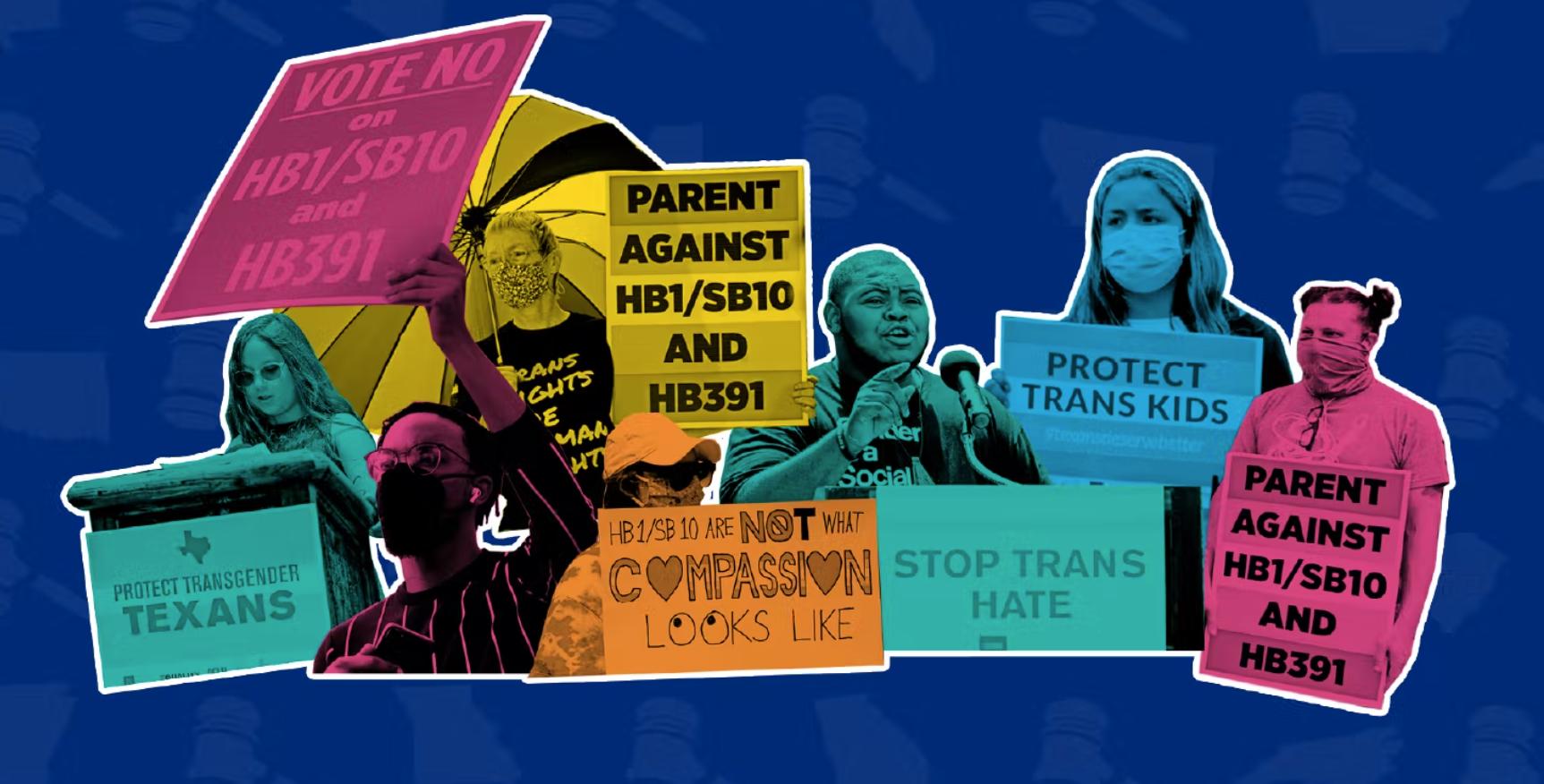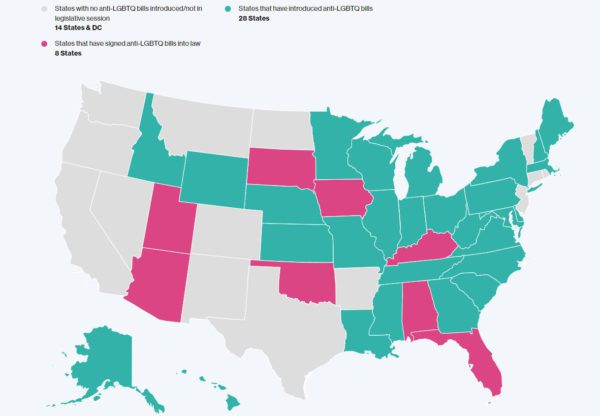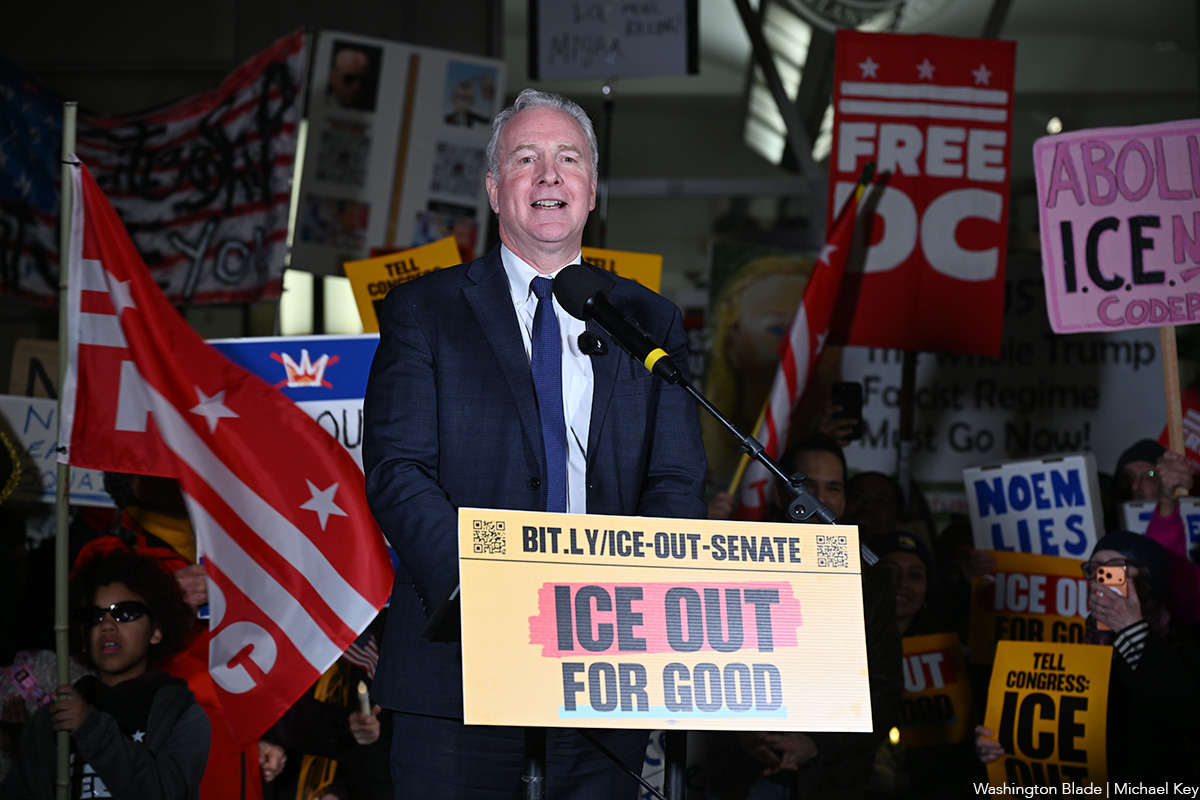Politics
Overview of over 300 anti-LGBTQ+ bills in 2022
As Republican politicians continue to push for limits to LGBTQ+ rights, many LGBTQ+ people & their allies promise to continue fighting

In May 2021, the Human Rights Campaign (HRC) officially announced the worst year for anti-LGBTQ+ legislation in recent history. At the time, state lawmakers introduced over 250 bills – from anti-Trans sports legislation to religious refusal measures – in statehouses across the country, 17 of which were enacted into law.
Now, LGBTQ+ rights in states seem to be taking even more of a hit. According to HRC, over 300 anti-LGBTQ+ bills have surfaced in 36 Legislatures. As the legislation increases – 41 such measures were introduced in 2018 – so does the number of bills passed and enshrined into state law, though LGBTQ+ advocates often challenge the laws in court.
The legislation overwhelmingly targets Trans youth, according to the organization, from blocking participation in sports to baring access to gender-affirming care. Lawmakers have also attempted, and in some cases passed, legislation limiting how LGBTQ+ issues can be taught in schools and keeping Trans kids from using restrooms that correspond with their gender identity.
“2022 is on track to surpass last year’s record number of anti-transgender bills,” Cathryn Oakley, state legislative director and senior counsel at the HRC, told the Blade, calling the “legislative attacks” on Trans youth “craven, baseless, and an effort to create more division, fearmonger, and rile up radical right-wing voters at the expense of innocent kids.”
Proponents of the bills say they are to “protect” parental rights, children and religious freedom. However, LGBTQ+ advocates and people continue to denounce the legislation as discriminatory and harmful.
This year, one of the most talked-about anti-LGBTQ+ measures was Florida’s so-called “Don’t Say Gay” bill, which Republican Gov. Ron DeSantis signed into law last month. The legislation will ban classroom instruction about sexual orientation and gender identity in grades K-3 if it survives legal challenges.
Days after DeSantis signed the bill, the first lawsuit against the measure emerged, arguing the statute “would deny to an entire generation that LGBTQ people exist and have equal dignity.”
“This effort to control young minds through state censorship —and to demean LGBTQ lives by denying their reality — is a grave abuse of power,” the lawsuit says.
Since Republican sponsors successfully pushed the bill through, other states have followed in Florida’s footsteps. Ohio, for example, introduced its version of the legislation roughly a week after DeSantis’ signature.
In Alabama, Republican Gov. Kay Ivey signed an anti-Trans bathroom bill with a last-minute amendment to keep educators from discussing gender identity and sexual orientation in grades K-5. Ivey didn’t stop there, also signing a bill that would ban gender-affirming care for minors.
Like Florida, LGBTQ+ advocates were quick to announce legal challenges to the legislation. Some of the most prominent LGBTQ+ and civil rights organizations – including the HRC, GLAD and Southern Poverty Law Center (SPLC) – announced a legal challenge in federal court against Alabama’s gender-affirming care ban.
In terms of legislation introduced, Tennessee has far outpaced other states, according to LGBTQ+ rights organization Freedom for All Americans. The group’s legislative tracker found over 30 bills limiting LGBTQ+ rights in the state – including a “Don’t Say Gay” bill and a ban on LGBTQ-themed literature in schools. But, unlike other Republican-controlled states, none have made it out of the statehouse.
Arizona has also been a hotspot for anti-LGBTQ+ legislation, with at least 17 bills, according to Freedom for All Americans. In March, Republican Gov. Doug Ducey signed two bills limiting the rights of Trans people in the state – one banning some types of medical care for Trans youth, and the other preventing Trans students from participating in school sports consistent with their gender identity.
“Across the country, moderate Republicans are struggling—and too often failing—to stop the takeover of their party by dangerous extremists,” Shannon Minter, legal director for the National Center for Lesbian Rights (NCLR), told the Blade at the time, adding: “We are in danger of watching large segments of our nation give way to authoritarian extremism.”
In other states, anti-LGBTQ+ legislation became law without support from its governor – Democratic or Republican. In fact, two Republican governors vetoed anti-Trans sports bills in late March.

Utah Gov. Spencer Cox and Indiana Gov. Eric Holcomb, both Republicans, vetoed legislation that barred Trans youth from participating in sports. Cox said the bill had “several fundamental flaws and should be reconsidered,” while Holcomb said the measure was in search of a problem.
In the end, however, the Utah House overturned Cox’s veto days later. Holcomb’s veto still stands.
“This [Utah] bill focuses on a problem of ‘fairness’ in school sports that simply does not exist — but its negative impacts on the mental health and well-being of trans and nonbinary youth are very real,” said Sam Ames, director of advocacy and government affairs at The Trevor Project. “These youth already face disproportionate rates of bullying, depression, and suicide risk, and bills like this one will only make matters worse.”
In recent weeks, two Democratic governors vetoed anti-LGBTQ+ legislation from their Republican-controlled legislatures.
Kentucky Democratic Gov. Andy Beshear vetoed legislation that would ban Trans girls from playing on sports teams in Kentucky schools that match their gender identities from sixth grade through college. GOP lawmakers quickly overturned the decision.
“Shame on the Kentucky General Assembly for attacking trans kids today,” said Chris Hartman, executive director for the Fairness Campaign. Shame on our commonwealth’s lawmakers for passing the first explicitly anti-LGBTQ law in Kentucky in almost a decade.”
Kansas Democratic Gov. Laura Kelly vetoed last weekend two anti-LGBTQ+ measures, the “Parents’ Bill of Rights” and the “Fairness in Women’s Sports” Acts.
GOP lawmakers in Idaho decided last month to effectively kill a bill criminalizing gender-affirming care, one of the most extreme proposals in the country. It would have made it a felony — punishable by up to life in prison — to provide minors with hormones, puberty blockers or gender-affirming surgery.
In a statement, Idaho Senate Republicans said they “stongly” oppose “any and all gender reassignment and surgical manipulation of the natural sex” on minors. But they also wrote that the controversial legislation “undermines” a parent’s right to make medical decisions for their children.
“We believe in parents’ rights and that the best decisions regarding medical treatment options for children are made by parents, with the benefit of their physician’s advice and expertise,” the senators wrote.
Texas is one of the 14 states with no anti-LGBTQ+ legislation, as the state only holds legislative sessions in odd years. However, the Lone Star State has made headlines for anti-Trans orders from Republican Gov. Greg Abbott.
Abbott, in February, directed the Texas Department of Family and Protective Services (DFPS) to investigate reports of gender-affirming care on minors as “child abuse.” The order followed an official opinion from state Attorney General Ken Paxton that called the treatment a form of “child abuse” under Texas law.
Since, two Texas judges have ruled against the policy – one in district court and the other after an appeal. Still, Paxton vows to keep fighting for the order in court.
But even as Republican politicians continue to push for limits to LGBTQ+ rights, many LGBTQ+ advocates, people and allies promise to continue fighting against the discriminatory efforts – whether in court or on the streets.
“The Human Rights Campaign strongly condemns these harmful, potentially life-threatening bills and will continue to use every tool at our disposal to fight for the rights of transgender youth and all LGBTQ+ people,” Oakley said.
In a January 2022 poll by The Trevor Project, an organization that provides crisis intervention and suicide prevention services to LGBTQ youth under 25, and Morning Consult, over two-thirds of LGBTQ youth said recent debates over state laws that target transgender people have negatively impacted their mental health.
“These results underscore how recent politics and ongoing crises facing the globe can have a real, negative impact on LGBTQ young people, a group consistently found to be at significantly increased risk for depression, anxiety and attempting suicide because of how they are mistreated and stigmatized in society,” Amit Paley, CEO of The Trevor Project, said in a statement.
Congress
McBride, other US lawmakers travel to Denmark
Trump’s demand for Greenland’s annexation overshadowed trip

Delaware Congresswoman Sarah McBride is among the 11 members of Congress who traveled to Denmark over the past weekend amid President Donald Trump’s continued calls for the U.S. to take control of Greenland.
McBride, the first openly transgender person elected to Congress, traveled to Copenhagen, the Danish capital, with U.S. Sens. Chris Coons (D-Del.), Thom Tillis (R-N.C.), Jeanne Shaheen (D-N.H.), Dick Durbin (D-Ill.), and Lisa Murkowski (R-Alaska) and U.S. Reps. Steny Hoyer (D-Md.), Gregory Meeks (D-N.Y.), Madeleine Dean (D-Pa.), Don Bacon (R-Neb.), and Sarah Jacobs (D-Calif.). The lawmakers met with Danish Prime Minister Mette Frederiksen and Greenlandic MP Pipaluk Lynge, among others.
“I’m grateful to Sen. Coons for his leadership in bringing together a bipartisan, bicameral delegation to reaffirm our support in Congress for our NATO ally, Denmark,” said McBride in a press release that detailed the trip. “Delaware understands that our security and prosperity depend on strong partnerships rooted in mutual respect, sovereignty, and self-determination. At a time of growing global instability, this trip could not be more poignant.”
Greenland is a self-governing territory of Denmark with a population of less than 60,000 people. Trump maintains the U.S. needs to control the mineral-rich island in the Arctic Ocean between Europe and North America because of national security.
The Associated Press notes thousands of people on Saturday in Nuuk, the Greenlandic capital, protested against Trump. British Prime Minister Keir Starmer is among those who have criticized Trump over his suggestion the U.S. would impose tariffs against countries that do not support U.S. annexation of Greenland.
A poll that Sermitsiaq, a Greenlandic newspaper, and Berlingske, a Danish newspaper, commissioned last January indicates 85 percent do not want Greenland to become part of the U.S. The pro-independence Demokraatit party won parliamentary elections that took place on March 12, 2025.
“At this critical juncture for our countries, our message was clear as members of Congress: we value the U.S.-Denmark partnership, the NATO alliance, and the right of Greenlanders to self-determination,” said McBride on Sunday in a Facebook post that contained pictures of her and her fellow lawmakers meeting with their Danish and Greenlandic counterparts.
Congress
Van Hollen speaks at ‘ICE Out for Good’ protest in D.C.
ICE agent killed Renee Nicole Good in Minneapolis on Jan. 7

U.S. Sen. Chris Van Hollen (D-Md.) is among those who spoke at an “ICE Out for Good” protest that took place outside U.S. Customs and Border Protection’s headquarters in D.C. on Tuesday.
The protest took place six days after a U.S. Immigration and Customs Enforcement agent shot and killed Renee Nicole Good, a 37-year-old woman in Minneapolis.
Good left behind her wife and three children.
(Video by Michael K. Lavers)
Congress
Advocates say MTG bill threatens trans youth, families, and doctors
The “Protect Children’s Innocence” Act passed in the House

Georgia Congresswoman Marjorie Taylor Greene has a long history of targeting the transgender community as part of her political agenda. Now, after announcing her resignation from the U.S. House of Representatives, attempting to take away trans rights may be the last thing she does in her official capacity.
The proposed legislation, dubbed “Protect Children’s Innocence Act” is among the most extreme anti-trans measures to move through Congress. It would put doctors in jail for up to 10 years if they provide gender-affirming care to minors — including prescribing hormone replacement therapy to adolescents or puberty blockers to younger children. The bill also aims to halt gender-affirming surgeries for minors, though those procedures are rare.
Greene herself described the bill on X, saying if passed, “it would make it a Class C felony to trans a child under 18.”
According to KFF, a nonpartisan source for health policy research, polling, and journalism, 27 states have enacted policies limiting youth access to gender-affirming care. Roughly half of all trans youth ages 13–17 live in a state with such restrictions, and 24 states impose professional or legal penalties on health care practitioners who provide that care.
Greene has repeatedly introduced the bill since 2021, the year she entered Congress, but it failed to advance. Now, in exchange for her support for the National Defense Authorization Act, the legislation reached the House floor for the first time.
According to the 19th, U.S. Rep. Sarah McBride (D-Del.), the first trans member of Congress, rebuked Republicans on the Capitol steps Wednesday for advancing anti-trans legislation while allowing Affordable Care Act tax credits to expire — a move expected to raise health care costs for millions of Americans.
“They would rather have us focus in and debate a misunderstood and vulnerable one percent of the population, instead of focusing in on the fact that they are raiding everyone’s health care,” McBride said. “They are obsessed with trans people … they are consumed with this.”
Polling suggests the public largely opposes criminalizing gender-affirming care.
A recent survey by the Human Rights Campaign and Global Strategy Group found that 73 percent of voters in U.S. House battleground districts oppose laws that would jail doctors or parents for providing transition-related care. Additionally, 77 percent oppose forcing trans people off medically recommended medication. Nearly seven in 10 Americans said politicians are not informed enough to make decisions about medical care for trans youth.
The bill passed the House and now heads to the U.S. Senate for further consideration.
According to reporting by Erin Reed of Erin In The Morning, three Democrats — U.S. Reps. Henry Cuellar and Vicente Gonzalez of Texas and Don Davis of North Carolina — crossed party lines to vote in favor of the felony ban, joining 213 Republicans. A total of 207 Democrats voted against the bill, while three lawmakers from both parties abstained.
Advocates and lawmakers warned the bill is dangerous and unprecedented during a multi-organizational press call Tuesday. Leaders from the Human Rights Campaign and the Trevor Project joined U.S. Rep. Becca Balint (D-Vt.), Dr. Kenneth Haller, and parents of trans youth to discuss the potential impact of restrictive policies like Greene’s — particularly in contrast to President Donald Trump’s leniency toward certain criminals, with more than 1,500 pardons issued this year.
“Our MAGA GOP government has pardoned drug traffickers. They’ve pardoned people who tried to overthrow the government on January 6, but now they want to put pediatricians and parents into a jail cell for caring for their kids,” said Human Rights Campaign President Kelley Robinson. “No one asked for Marjorie Taylor Greene or Dan Crenshaw or any politician to be in their doctor’s office, and they should mind their own business.”
Balint, co-chair of the Congressional Equality Caucus, questioned why medical decisions are being made by lawmakers with no clinical expertise.
“Parents and doctors already have to worry about state laws banning care for their kids, and this bill would introduce the risk of federal criminal prosecution,” Balint said. “We’re talking about jail time. We’re talking about locking people up for basic medical care, care that is evidence-based, age-appropriate and life-saving.”
“These are decisions that should be made by doctors and parents and those kids that need this gender-affirming care, not certainly by Marjorie Taylor Greene.”
Haller, an emeritus professor of pediatrics at St. Louis University School of Medicine, described the legislation as rooted in ideology rather than medicine.
“It is not science, it is just blind ideology,” Haller said.
“The doctor tells you that as parents, as well as the doctor themselves, could be convicted of a felony and be sentenced up to 10 years in prison just for pursuing a course of action that will give your child their only chance for a happy and healthy future,” he added. “It is not in the state’s best interests, and certainly not in the interests of us, the citizens of this country, to interfere with medical decisions that people make about their own bodies and their own lives.”
Haller’s sentiment is echoed by doctors across the country.
The American Medical Association, the nation’s largest organization that represents doctors across the country in various parts of medicine has a longstanding support for gender-affirming care.
“The AMA supports public and private health insurance coverage for treatment of gender dysphoria and opposes the denial of health insurance based on sexual orientation or gender identity,” their website reads.
Rodrigo Heng-Lehtinen, senior vice president of public engagement campaigns at the Trevor Project, agreed.
“In Marjorie Taylor Greene’s bill [it] even goes so far as to criminalize and throw a parent in jail for this,” Heng-Lehtinen said. “Medical decisions should be between patients, families, and their doctors.”
Rachel Gonzalez, a parent of a transgender teen and LGBTQ advocate, said the bill would harm families trying to act in their children’s best interests.
“No politician should be in any doctor’s office or in our living room making private health care decisions — especially not Marjorie Taylor Greene,” Gonzalez said. “My daughter and no trans youth should ever be used as a political pawn.”
Other LGBTQ rights activists also condemned the legislation.
Tyler Hack, executive director of the Christopher Street Project, called the bill “an abominable attack on the transgender community.”
“Marjorie Taylor Greene’s last-ditch effort to bring her 3-times failed bill to a vote is an abominable attack on the transgender community and further cements a Congressional career defined by hate and bigotry,” they said. “We are counting down the days until she’s off Capitol Hill — but as the bill goes to the floor this week, our leaders must stand up one last time to her BS and protect the safety of queer kids and medical providers. Full stop.”
Hack added that “healthcare is a right, not a privilege” in the U.S., and this attack on trans healthcare is an attack on queer rights altogether.
“Marjorie Taylor Greene has no place in deciding what care is necessary,” Hack added. “This is another attempt to legislate trans and queer people out of existence while peddling an agenda rooted in pseudoscience and extremism.”
U.S. Rep. Mark Takano (D-Calif.), chair of the Congressional Equality Caucus, also denounced the legislation.
“This bill is the most extreme anti-transgender legislation to ever pass through the House of Representatives and a direct attack on the rights of parents to work with their children and their doctors to provide them with the medical care they need,” Takano said. “This bill is beyond cruel and its passage will forever be a stain on the institution of the United States Congress.”
The bill is unlikely to advance in the Senate, where it would need 60 votes to pass.



















